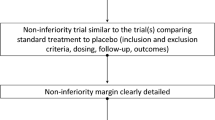Abstract
In order to evaluate the effects of a particular treatment strategy on mortality and major morbidity within a disease entity, large, multinational, relatively long-term clinical endpoint studies are often conducted. The primary challenge of conducting these studies is to maintain consistency in the interpretation of the clinical endpoints across different geographic areas and over the long time course of the study. The success of a clinical endpoint study depends on understanding the challenges and incorporating the special requirements of these studies into the protocol design and operational procedures throughout the study.
Similar content being viewed by others
References and Recommended Reading
Psaty B, Weiss N, Furberg C, et al.: Surrogate end points, health outcomes, and the drug-approval process for the treatment of risk factors for cardiovascular disease. JAMA 1999, 282:786–790.
New drug, antibiotic and biological drug product regulations: accelerated approval. Proposed Rule. 57 Federal Register 1992, 13234–13242,
Fleming TR, DeMets DL: Surrogate end points in clinical trials: are we being misled? Ann Intern Med 1996, 125:605–613.
Sobel BE, Furberg CD: Surrogates, semantics, and sensible public policy. Circulation 1997, 95:1661–1663.
Collins R, Peto R, Gray R, Parish S: Large-scale randomized evidence: trials and overviews. In Oxford Textbook of Medicine, Volume 1. Edited by Weatherall DJ, Ledingham JGG, Warrell DA. Oxford: Oxford University Press; 1996:21–32.
Collins R, MacMahon S: Reliable assessment of the effects of treatment on mortality and major morbidity, I: clinical trials. Lancet 2001, 357:373–380.
Wittes J, Palensky J, Asner D, et al.: Experience collecting interim data on mortality: an example from the RALES study. Curr Control Trials Cardiovasc Med 2001, 2:59–62.
DeMets D, Califf R: Lessons learned from recent cardiovascular clinical trials: part II. Circulation 2002, 106:880–886.
Mahaffey K, Harrington R, Akkerhuis M, et al.: Systematic adjudication of myocardial infarction end-points in an international clinical trial. Curr Control Trials Cardiovasc Med 2001, 2:180–186.
The GUSTO-IIb Investigators: A comparison of recombinant hirudin with heparin for the treatment of acute coronary syndromes. N Engl J Med 1996, 335:775–782.
The IMPACT-II Investigators: Randomised placebo-controlled trial of effect of eptifibatide on complications of percutaneous coronary intervention. Lancet 1997, 349:1422–1428.
Mahaffey KW, Tardiff BE, Granger CB, et al.: Disagreement between site investigators and clinical event committees is common and can affect trial results [abstract]. J Am Coll Cardiol 1998, 31:184A-185A.
Mahaffey KW, Akkerhuis M, Boersma H, et al.: The identification of MI in clinical trials is difficult and there is substantial difference between the assessment by site investigators and a clinical events committee: results from PURSUIT [abstract]. Eur Heart J 1998, 19:55.
Code of Federal Regulations Title 21, Volume 1, Revised as of April 1, 2002.
Meinert C. Clinical Trials Design, Conduct, and Analysis. New York: Oxford Univeristy Press; 1986:241.
Department of Health and Human Services, Food and Drug Administration. Draft “Guidance for Clinical Trial Sponsors on the Establishment and Operation of Clinical Trial Data Monitoring Committees.” Federal Register. November 20, 2001. Vol 66, No. 224, 58151–58153. Docket No. 01D-0489, CBER 200130 [FR Doc. 01–28962]. http://www.fda.gov/OHRMS/DOCKETS/98fr/112001c.htm. Accessed July 1, 2002.
Author information
Authors and Affiliations
Rights and permissions
About this article
Cite this article
Isaacsohn, J.L., Khodadad, T.A., Soldano-Noble, C. et al. The challenges of conducting clinical endpoint studies. Curr Atheroscler Rep 5, 11–14 (2003). https://doi.org/10.1007/s11883-003-0062-6
Issue Date:
DOI: https://doi.org/10.1007/s11883-003-0062-6




